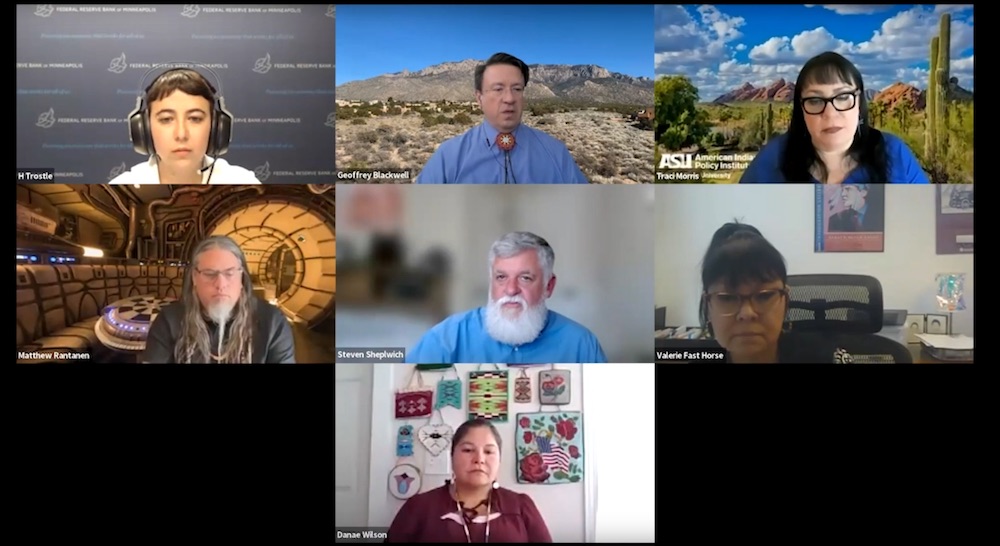
- Details
- By Chez Oxendine
- Economic Development
An online event presented by the Center for Indian Country Development (CICD) this week focused on data sovereignty, workforce development, and infrastructure ownership as key goals for Native Americans amid surging advances in connectivity.
The CICD, a unit of the Federal Reserve Bank of Minneapolis, hosted seven speakers to the “Nuts, Bolts, and Cables: Opportunities in Tribal Broadband” webinar to discuss connectivity in Indian Country, including current gaps and opportunities ahead for newly connected tribes and their citizens.
“[The internet] is 21st century water — it’s the new most important, critical infrastructure of our time,” said Geoffrey Blackwell, general counsel for National Congress of American Indians. Data sovereignty, which is the right of tribal nations to control the collection, use and sharing of data about their lands and communities, is the overarching call to action for tribal nations, he added.
Blackwell emphasized that tribal nations need to think beyond simply installing broadband infrastructure and consider how the data generated by that infrastructure will be used and protected. He said tribes have developed “pain points” as a result of insufficient technology and data, and that the data that is collected can be used to deprive tribes of support, rather than enable it. The idea behind data sovereignty to control the data and be owners of it, he said.
Traci Morris, director of the American Indian Policy Institute, said digital sovereignty is the right of tribal nations to control the collection, use, and sharing of data about their communities, as well as the new network infrastructure used to gather and disseminate it.
Ultimately, the people being discussed and informed by the data should be in control of how that data is collected and distributed, Morris said.
“[We have to protect] folks who are the subject of that data in everything — in banking, education, health care, you name it,” Morris said. “Digital sovereignty is in the plans that tribes create to handle all of this data.”
Other panelists discussed how traditional sovereignty issues intersect with the growing tribal connectivity infrastructure. Danae Wilson, assistant director for internet access at the White House Office of Science and Technology, said the Biden administration is using tribal consultations to address complex issues of permitting, rights of way, and the allocation of federal funding.
Wilson emphasized that the administration is focused on “meaningful consultation” that can answer questions of consent and funding. She pointed to initiatives like the National Telecommunications and Information Administration’s $3 billion Tribal Broadband Connectivity Program, and a spectrum licensing auction through the Federal Communications Commission in 2019.
“We can move the dial,” Wilson said. “When tribal nations are heard, it changes the way we consider funding internally at the federal government, which can change its policy according to the needs of those nations.”
Matthew Rantanen, director of technology of the Southern California Tribal Chairmen’s Association, has watched tribes across California build out in different ways. Some tribes have relied on outside carriers to walk them through the process, developing and engineering new network infrastructure that is then sold to the consulting tribe.
This approach skirts around a longstanding issue in tribal connectivity: developing the workforce and capacity to manage new networks, Rantanen said.
“Some tribes don’t have the capacity right now or the people power,” Rantanen said. “They may not have the technical expertise or the sheer return on investment - there’s not enough homes to generate enough dollars to pull that off [on their own.]”
Other tribes, like the Coeur d’Alene Tribe, have been “home growing” their IT department for years, according to Coeur d’Alene IT Director Valerie Fast Horse. She described building out a network with the help of an employee who was just out of high school.
That kickstarted a practice of providing young people opportunities to go into IT, Fast Horse said. She trains new employees in support of Red Spectrum, an LLC spun off by the tribe after their broadband services began.
“We grow our own,” Fast Horse said. “I invite young tribal members to come in and we do on the job training - digging, trenching, climbing, wearing a hat when you’re climbing and what gear to wear. We try to meet their desire within the company.”
The White House’s Wilson pointed to apprenticeship programs available at both the federal and state levels, such as community college courses in Maine, as potential solutions to getting new IT employees the training they need.
Building a tribal workforce around connectivity is a win-win, Wilson said. Tribal members can leap into a career with a livable wage, while tribes reap the benefits of an educated, trained workforce built to maintain their new networks.
“It's great,” Wilson said. “We have to think of broadband access as facilitating economic development — letting others do business, but also as a way of developing your own, and providing new skill sources.”
However difficult capacity building may be, it’s ultimately worth it, many of the panelists said. Developing a tribally-owned provider plays back into the overarching principles of digital sovereignty, Rantanen said. Tribally owned networks allow a degree of customization to fit a community’s unique needs that larger, private providers likely can’t match.
“You have an intimate relationship with all of the participants in your network, who you know on a day to day or a week to week basis,” Rantanen said. “It's time that we are providers, not consumers in this space.”
Fast Horse echoed the sentiment.
“The idea of knowing our own people is, you know, that I think the greatest joy that I get from providing this service,” Fast Horse said. “It's more of a personal relationship with your community.”
